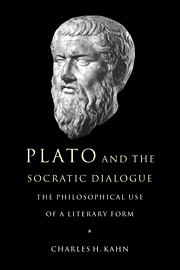Book contents
- Frontmatter
- Contents
- Preface
- List of abbreviations
- 1 Sōkratikoi logoi: the literary and intellectual background of Plato's work
- 2 The interpretation of Plato
- 3 Socrates
- 4 Plato as a minor Socratic: Ion and Hippias Minor
- 5 Gorgias: Plato's manifesto for philosophy
- 6 The priority of definition: from Laches to Meno
- 7 Charmides and the search for beneficial knowledge
- 8 Protagoras: virtue as knowledge
- 9 The object of love
- 10 The emergence of dialectic
- 11 The presentation of the Forms
- 12 Phaedrus and the limits of writing
- Appendix On Xenophon's use of Platonic texts
- Bibliography
- Indexes
6 - The priority of definition: from Laches to Meno
Published online by Cambridge University Press: 02 November 2009
- Frontmatter
- Contents
- Preface
- List of abbreviations
- 1 Sōkratikoi logoi: the literary and intellectual background of Plato's work
- 2 The interpretation of Plato
- 3 Socrates
- 4 Plato as a minor Socratic: Ion and Hippias Minor
- 5 Gorgias: Plato's manifesto for philosophy
- 6 The priority of definition: from Laches to Meno
- 7 Charmides and the search for beneficial knowledge
- 8 Protagoras: virtue as knowledge
- 9 The object of love
- 10 The emergence of dialectic
- 11 The presentation of the Forms
- 12 Phaedrus and the limits of writing
- Appendix On Xenophon's use of Platonic texts
- Bibliography
- Indexes
Summary
THE THRESHOLD DIALOGUES
On basic issues of moral philosophy Plato remains faithful to the position presented in the Gorgias. In particular, it remains his view that the goal of rational politics is the same as the goal of moral education: to produce virtue in human souls. That will require a technikos, an expert on aretē. But the technikos of the Gorgias is not yet the philosopher-king. For that we will need the psychology, epistemology, and metaphysics of the Republic. So there is room for a large development of Plato's thought between the Gorgias and the middle dialogues: Symposium, Phaedo, and Republic.
It is in this intervening space that I would locate the seven threshold dialogues: Laches, Charmides, Euthyphro, Protagoras, Meno, Lysis, and Euthydemus. These dialogues present and elaborate themes that come together in the central books of the Republic, where technē becomes dialektikē, the master art of the philosopherking. Now for Plato a technē is defined by reference to its object or subject matter. The object of dialektikē will be the forms or essences of things. So the most decisive step in Plato's gradual articulation of the technē of the philosopher-king will be his introduction of the notion of essence in the dialogues of definition. I suggest that the search for essence in the Laches, Euthyphro, and Meno is from the start future-oriented, that is to say, designed to prepare the way for the doctrine of Forms. But Plato's mode of exposition is so subtly ingressive that this design can only be perceived retrospectively, from the vantage point of the middle dialogues.
The seven threshold dialogues form a diverse group.
- Type
- Chapter
- Information
- Plato and the Socratic DialogueThe Philosophical Use of a Literary Form, pp. 148 - 182Publisher: Cambridge University PressPrint publication year: 1997



